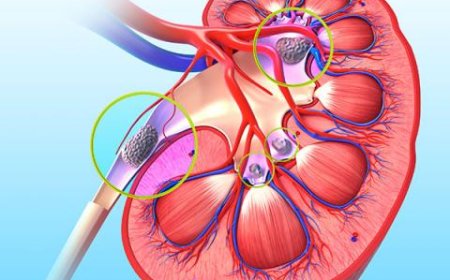Primary Care Physicians: Your Trusted Partners in Lifelong Health
Discover how primary care physicians support your lifelong health through preventive care, chronic condition management, and personalized treatment. Learn why having a trusted PCP is essential.

Introduction
In todays complex healthcare landscape, primary care physicians (PCPs) serve as the foundation of personalized, continuous, and preventive medical care. From treating everyday illnesses to managing chronic diseases, primary care physicians are often the first medical professionals patients turn toand they remain constant allies throughout life.
What Is a Primary Care Physician?
A primary care physician is a doctor who provides general healthcare services and serves as your first point of contact in the healthcare system. They manage overall health and wellness by diagnosing and treating common illnesses, offering preventive care, managing chronic conditions, and coordinating with specialists when needed.
Primary care physicians often specialize in:
- Family Medicine: Care for patients of all ages, from infants to seniors
- Internal Medicine: Focus on adult care and chronic disease management
- Pediatrics: Specializes in health care for infants, children, and adolescents
- Geriatrics: Tailored care for elderly patients
The Role of Primary Care Physicians
1. Preventive Care
Prevention is at the heart of primary care. Your PCP helps you avoid illness and maintain wellness through:
- Annual physical exams
- Vaccinations and immunizations
- Screenings for blood pressure, cholesterol, diabetes, and cancers
- Lifestyle counseling on diet, exercise, and smoking cessation
Early detection of risk factors can prevent more serious problems down the line.
2. Acute Illness Treatment
When you're not feeling well, your PCP is the first person you call. They diagnose and treat common acute conditions such as:
- Cold, flu, and infections
- Rashes, allergies, and skin conditions
- Minor injuries like sprains or strains
- Gastrointestinal issues (nausea, constipation, etc.)
- Earaches, sore throats, and headaches
They may also prescribe medications or recommend over-the-counter remedies, depending on the condition.
3. Chronic Disease Management
Chronic diseases like diabetes, hypertension, asthma, and arthritis require long-term care and monitoring. A primary care physician helps:
- Develop and adjust treatment plans
- Monitor disease progression
- Coordinate medication management
- Refer to specialists when necessary
Having a consistent physician ensures better disease control and improved quality of life.
4. Mental and Emotional Health Support
Many people dont realize that primary care physicians also play a key role in mental health. They provide support for:
- Anxiety and depression
- Sleep issues
- Stress management
- Medication for mental health conditions
- Referrals to psychiatrists or counselors
Because of their long-term relationships with patients, PCPs are well-positioned to notice emotional and behavioral changes over time.
5. Care Coordination
Your PCP acts as the quarterback of your healthcare team, ensuring all aspects of your health are addressed. They coordinate with:
- Cardiologists
- Endocrinologists
- Dermatologists
- Physical therapists
- Mental health professionals
This seamless care ensures better outcomes and avoids duplication or gaps in treatment.
Benefits of Having a Primary Care Physician
1. Continuity of Care
One of the biggest advantages is continuity. You see the same provider over the yearsor even decadesallowing them to understand your personal and family medical history in depth.
2. Personalized Attention
Primary care physicians take a holistic approach to health, addressing not just physical symptoms but also lifestyle, emotional well-being, and environmental factors.
3. Cost-Effective Health Management
Preventive care and early detection often result in lower healthcare costs, reducing the need for expensive emergency care or hospitalizations.
4. Improved Long-Term Health
Patients with a consistent PCP are more likely to:
- Receive regular screenings
- Follow treatment plans
- Have better-controlled chronic conditions
- Experience improved health outcomes and longer lifespans
When Should You See a Primary Care Physician?
You dont need to be sick to visit your PCP. You should schedule an appointment for:
- Annual physical exams
- Vaccinations and health screenings
- Managing ongoing conditions like diabetes or asthma
- Prescription refills or medication reviews
- Referrals to specialists
- Mental health check-ins
- New or unusual symptoms
Establishing a relationship with your PCP now ensures you're covered when urgent or serious issues arise later.
How to Choose the Right Primary Care Physician
Finding the right primary care doctor is a personal decision. Consider the following:
- Credentials and experience: Board-certified in family or internal medicine
- Communication style: Listens well and explains things clearly
- Accessibility: Convenient office hours, telehealth availability
- Patient reviews: Online feedback and word-of-mouth recommendations
- Insurance compatibility: Accepts your health plan
- Special interests: Some PCPs focus on lifestyle medicine, womens health, or geriatrics
Choose someone you trust and feel comfortable speaking with about personal health issues.
The Future of Primary Care
The role of primary care physicians is expanding with advances in:
- Telemedicine: Virtual visits for convenience and flexibility
- Preventive health technologies: Wearables and apps to monitor chronic diseases
- Team-based care: Collaborating with nurse practitioners, dietitians, and behavioral health specialists
- Personalized medicine: Treatments based on genetics, lifestyle, and data
Primary care is no longer just about reacting to illnessits about proactive, personalized health management.
Final Thoughts
Primary care physicians are much more than general practitioners. They are trusted health partners who walk with you through every stage of lifefrom childhood vaccines to geriatric care. They provide early diagnoses, coordinate specialist referrals, manage chronic conditions, and offer preventive careall with a long-term, patient-centered approach.







































